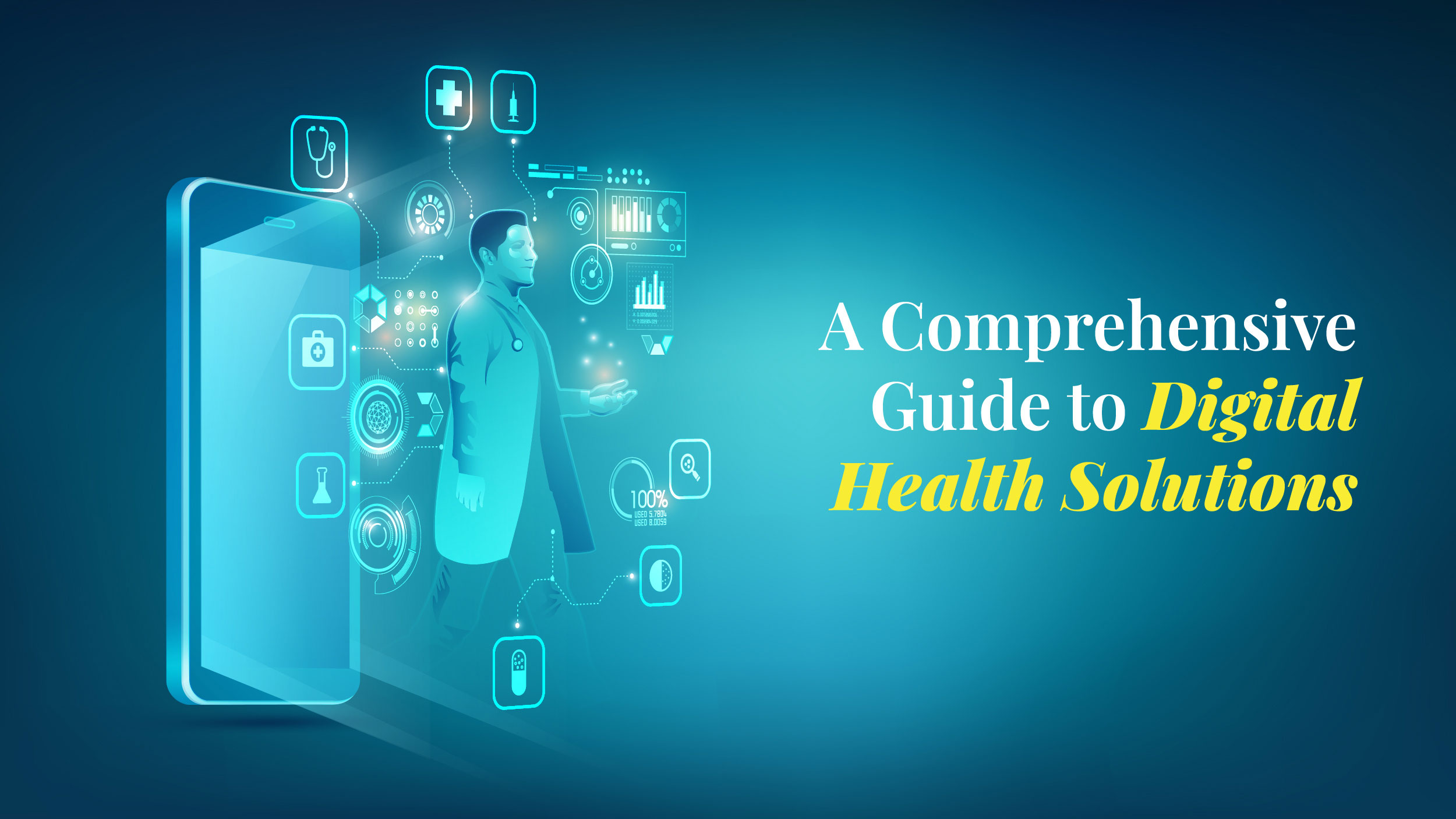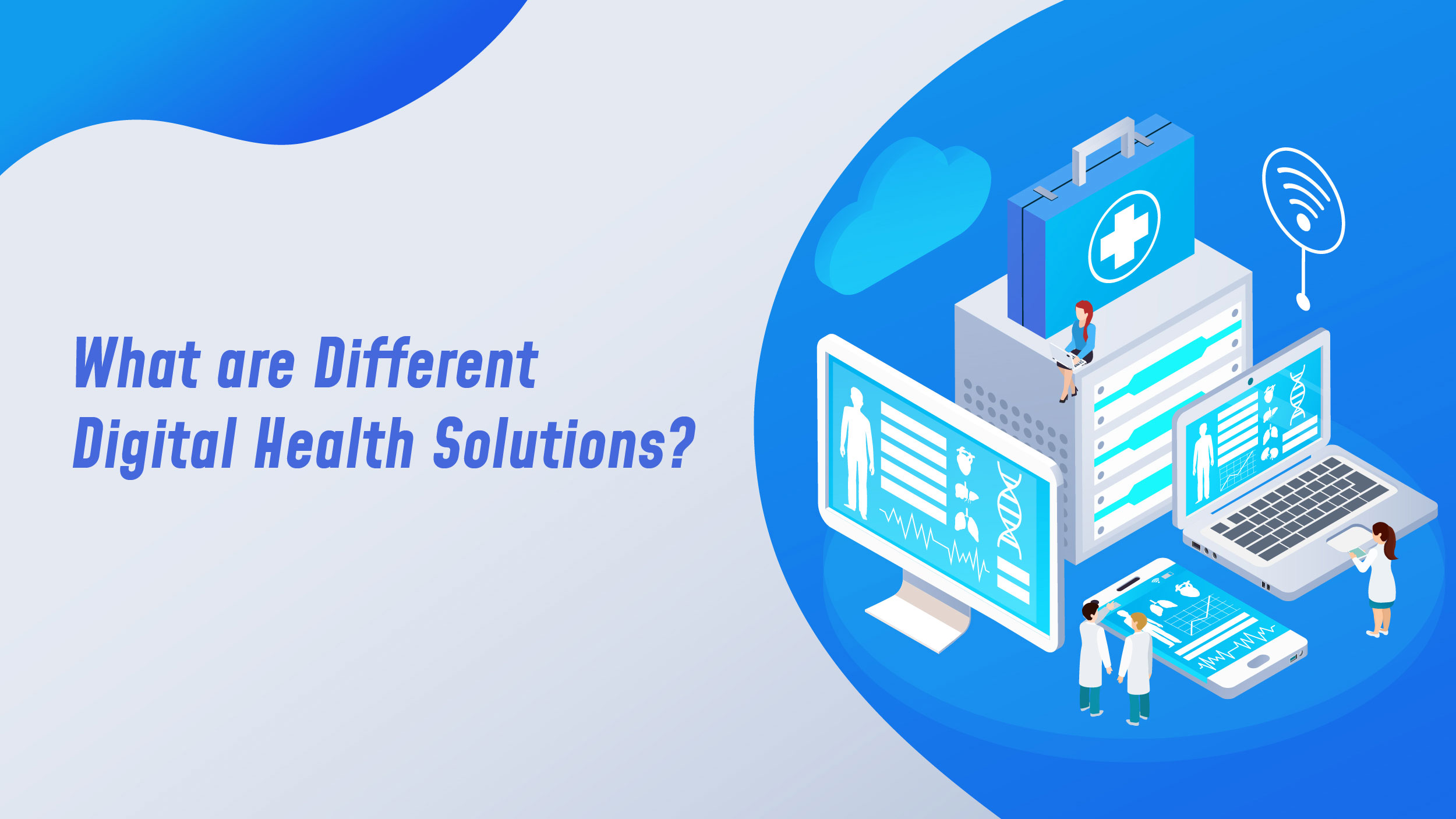A new era in healthcare when technology and medicine work together to transform how we see patient care and wellness. The emergence of cutting-edge digital health solutions is fueling a remarkable shift in this digital age. We are moving towards a day where healthcare is more accessible, effective, and individualized due to cutting-edge technology like artificial intelligence, the Internet of Medical Things, telehealth, and personalized medicine.
Let’s look into the limitless opportunities that await us in this amazing era of digital health innovation as we together open the doors to a new paradigm in healthcare.
What is Digital Health?
The term “Digital Health” refers to a number of concepts, including e-health, m-health, and tele-health, which also concentrate on additional elements like remote patient monitoring, electronic medical records, and digital treatments like mental health evaluation and depression counseling, among others. Through information technology, artificial intelligence, and machine learning, it keeps information collectively and may gather, exchange, analyze, and use data to support healthcare professionals in making decisions that will improve the quality of patient care.
Digital health solutions have seen recent advances as a result of government health insurance programmes like the U.S. Affordable Care Act (ACA). Despite initial technological problems, one of the goals of the Affordable Care Act was to use technology to raise the standard of healthcare.
A Comprehensive Guide to Digital Health Solutions

Digital health solutions are a broad category of programmes and technology used to improve the effectiveness and personalisation of healthcare delivery. This can include telemedicine, wearable technology, augmented reality, virtual reality, and other technological advancements that help patients and healthcare workers manage illnesses and health risks while also encouraging health and wellbeing.
Digital health solutions aim to connect health systems and make it easier to understand health issues and challenges experienced by patients in more individualized and accurate ways. The role that digital health could play in widening the digital and physical divide between social majority and minority groups raises concerns about potential privacy abuses of personal health data, which could discourage people from using digital health systems out of mistrust.
What is the Difference Between Digital Health and Telemedicine?
Although the terms “digital health” and “telemedicine” are frequently used in connection with healthcare and technology, they refer to various facets of healthcare delivery.
Digital Health
The use of digital technology, including mobile apps, wearables, electronic health records (EHRs), and health information systems, to enhance patient care, healthcare services, and general wellness is referred to as “digital health,” which is a broad term. It includes a broad range of tools and techniques that make use of digital platforms and applications to improve data management, patient interaction, and healthcare delivery. Technology is used in digital health to support medical procedures, encourage preventive care, provide remote monitoring, enhance health education, and give people the power to manage their own health.
Telemedicine
On the other side, telemedicine is a particular subset of digital health that describes the provision of healthcare services and medical consultations over distance utilizing telecommunications technology. Patients and healthcare professionals are linked through the use of video conferencing, phone calls, and secure messaging platforms, allowing patients to obtain medical advice, diagnoses, treatments, and follow-up care without having to make in-person visits. By removing geographic restrictions, telemedicine enables patients to get medical care from the convenience of their homes or any other location with an internet connection. Patients with restricted mobility, those living in rural places, and those looking for ease and quick access to medical knowledge will all find it extremely helpful.
What are Different Digital Health Solutions?

Digital platforms and technologies are used in a wide range of digital solutions for health plans with the goal of enhancing the provision of healthcare services, enhancing patient outcomes, and streamlining operational procedures. These solutions make use of data analytics and digital tools to serve stakeholders such as health plan providers, members, and members in various ways. Here are a few significant digital health solutions frequently used in health plans:
1. Health Information Systems (HIS):
Strong health information systems provide for effective management and preservation of administrative data, electronic health records (EHRs), and patient data. These tools improve interoperability, data sharing, and data analytics, enabling health plans to analyze patient outcomes, make better informed decisions, and simplify administrative procedures.
2. Telehealth and Virtual Care:
Telehealth platforms enable remote access to medical services through video consultations, virtual visits, and remote monitoring. For people living in remote or underdeveloped locations in particular, this digital solution enhances access to healthcare. It lowers barriers to accessing healthcare and enables early detection, effective treatment, and continued management of chronic illnesses.
In March 2020, there were 154% more telehealth visits in the United States than there were in the same month the previous year, indicating a boom in demand for telehealth services, according to National Centre for Health Statistics, a division of the Centres for Disease Control and Prevention (CDC).
3. Mobile Health (mHealth) Apps:
Health plans’ members now have access to mobile apps that enable them to manage appointments, get health information, and keep tabs on their wellness and health objectives. In order to encourage patient engagement and self-management, these apps frequently incorporate functions like symptom checks, prescription reminders, and access to telemedicine services.
By combining, major clinical health AI apps might save the US healthcare industry $150 billion annually by 2026, according to an Accenture study.
4. Health Risk Assessment Tools:
With the use of digital health risk assessment tools, members’ pertinent health information is collected to evaluate their overall health state, spot potential hazards, and offer individualized suggestions for preventive care. These tools support health plans’ proactive population health management, identification of people who are at high risk, and application of focused interventions.
5. Data Analytics and Predictive Modeling:
Health plans may spot trends, predict future healthcare requirements, and optimize budget allocation with the help of digital health solutions that make use of data analytics and predictive modeling. By aiding in risk assessment, illness management, and population health management, these tools improve the effectiveness of treatment delivery and save costs.
Future of Digital Health Solutions
As technological developments continue to transform healthcare, the future of digital health solutions is incredibly promising. Digital health will revolutionize patient care, putting artificial intelligence, the Internet of Medical Things, telehealth, and personalized medicine at the forefront. Predictive analytics and precise diagnostics will be fueled by AI and machine learning, and the IoMT will make real-time monitoring and remote patient care possible. In the end, digital health technologies will alter healthcare delivery, improve patient outcomes, and empower individuals.






